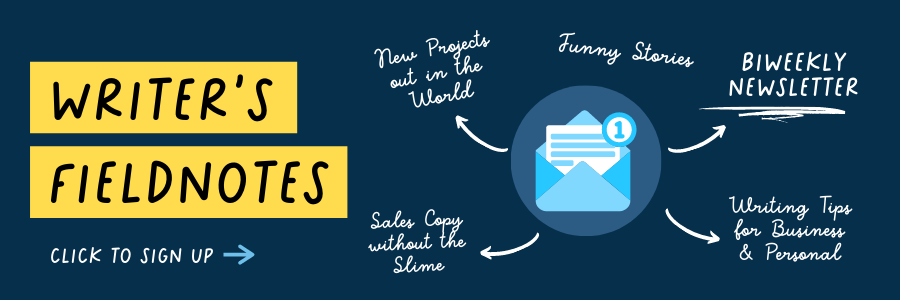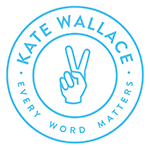Clichés are common. And they are the bane of good writing.
Clichés are lazy. They are a shortcut to avoid the work of custom copywriting. Reused so often, they’ve become generic. Would you rather Hellman’s or No-Name mayo? For me, Hellman’s wins every time.
The hard truth is, if your copy is store-brand mayo, you’re going to come across as bland and unoriginal.

The solution? Show, don’t tell.
Instead of telling us that you’re a “trusted partner,” show us the proof. Give us stories and examples. Get specific. Provide details. (Need a little more guidance? Click to download my workbook on 15 original brand stories you can tell today.)
And remember: writing is a confidence game. It takes guts to resist the tendency to repeat the common claims of your industry. But be brave, and you’ll see how cutting clichés from your copywriting is a strong differentiator. In a sea of “innovators,” you’ll set yourself apart if you can show how you’re doing things differently and—and this is key—why it matters.
The easiest way to eradicate clichés is to look for phrases or copy that come too easy. If there’s no struggle required, in the writing, it probably needs work. Sorry.
Cliché-free writing demands inquiry on the part of the writer. You must become like a three-year-old, constantly asking yourself the two most important questions: why and how.
Why is this important? How does this help? How does this make us unique? Why would anyone care?
Are you still struggling? At the very least, stretch yourself to find other words. Grab your thesaurus and explore different terms to better describe your company, product or service. And I’ve amassed a little list of some of the most common offenders for you.

Here are my the Top 10 copywriting clichés to avoid:
Trusted Partner:
Trust is easy to claim, difficult to demonstrate. But when all your competitors are also playing the trust card in their marketing and communications, it stops being a competitive advantage and is just a filler word.
Show us the trust. Do the vast majority of your clients return? Got a glowing testimonial from a client? Or perhaps a high trust rating in a customer survey? Great. Use that.
But don’t stop there. Ask yourself: why does that matter? That’s the story you should be telling.
Top Service:
If your service is truly the best, tell us why.
What does “top” or “best” look like in your world? Get specific. Do you return customer calls on the same day? Hire only certified professionals in your field? Again, the magic is in the unique and telling details that make you tangible and distinct.
Innovative:
If there’s one word I’d vote to remove from use forever, it’s innovative.
This buzzword started in tech and, like so many things from that sector, has become ubiquitous. Today, it seems, every company and even non-profit is an innovator. Instead of claiming you’re innovative, show us how you’ve made something different and new. Describe why that matters. How is it better than what came before? How does it make the lives of your clients or even society better?
If there’s one word I’d vote to remove from use forever, it’s innovative.
Kate
Cutting-Edge:
Ditto next-generation and next-level. As with “innovative,” these are flabby descriptors for change and improvement.
Outside the Box:
This one makes me shudder. It’s one of the corniest examples of business-speak (think: blue sky, parking lot and the thankfully mostly abandoned—synergy.)
If you do things differently, describe it.
Optimization:
In our productivity culture, everyone, it seems, is optimizing all the time. Which makes it kind of bland.
If you’re able to do things more effectively, tell us how.
One-Stop-Shop:
I’m guilty of having used this recently. Bad copywriter! I was short on space and took a shortcut. I regret it.
Your business is not a one-stop-shop like a convenience store. Your unique offering is specifically what the customer needs, so take the time to walk them through it.

Strategic:
The Oxford Canadian Dictionary defines strategic as “relating to the identification of long-term or overall aims and interests and the means of achieving them.” Isn’t this kind of a baseline description of how any successful organization should be operating?
If you’re able to bring a different type or level of analysis, describe it and, again, explain why it matters.
Unprecedented Times/New Normal:
COVID-19 brought a fresh batch of copywriting clichés.
OK, so maybe in the early days of the pandemic, these now threadbare terms felt apt. But after a week of press releases, communique and articles on the new normal in these unprecedented times, these phrases had made the quick leap from fresh to flat.
If you find yourself using these pandemic clichés, stop and stretch for more specific words that apply to you and your brand
The tough thing about eradicating clichés from your writing is that they are so widely used, it can be hard to spot them. They are part of our everyday language, which is why they’re counter to good, strong writing: they’re overused to the point that they don’t have much meaning—and they weaken your marketing and communications.
But with enough practice, you can spot them and use them as an opportunity to write better copy.
Is there a cliché that you see all the time not listed here? Comment below with your least favourite.




Here is a cliche I’d like to overcome: “rich history”
Working to overcome this one: leveraged as in Leveraged her/his experience/eduction etc to do whatever….